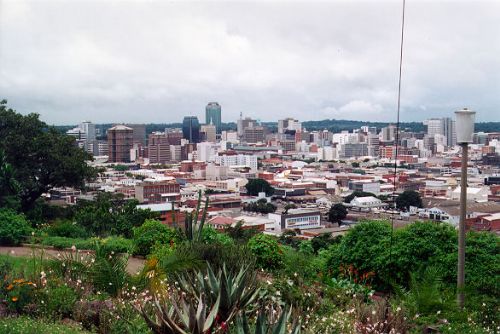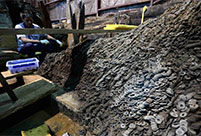

 |
By Miroslav Atanasov, Ph.D., Renmin University of China
Last week Zimbabwean President Robert Mugabe opened a renovated road heading towards Harare International Airport - just in time to receive Chinese President Xi Jinping on Dec. 1-2. Afterwards, Xi will travel to Johannesburg, South Africa for the 6th Forum on China-Africa Cooperation.
The Republic of Zimbabwe in southern Africa is a landlocked country located between the Zambezi and Limpopo Rivers. It borders South Africa, Botswana, Zambia, and Mozambique. The capital and largest city is Harare.
The nation is ethnically diverse with a population of 13 million people, recognizing 16 official languages, but the most commonly-used are English, Shona, and Ndebele.
Zimbabwe is a beautiful country, which according to some sources, enjoys the world's best climate. It holds a rich diversity of land terrain, flora, and fauna. The spectacular Victoria Falls is located in the northwest along the border with Zambia.
Relations between Beijing and Harare date back to the Rhodesian Bush War, also called Second Chimurenga ("revolutionary struggle"). At that time, Mugabe had secured Beijing's support for the Zimbabwe African National Union.
Formal diplomatic relations were established a year later on April 18, 1980 when Zimbabwe declared its independence from the United Kingdom.
Zimbabwe's relations with China have become especially important after 2003, when Mugabe introduced land reforms, in which Harare repossessed land from white farmers. The nation was ostracized by the West, which sparked an economic depression and collapse of its currency.
Nevertheless, Beijing had remained a strong international supporter for Harare. In 2008, when the United Stated and Great Britain introduced a UN resolution for further sanctions against Zimbabwe, demanding "regime change," their plan was foiled by China and Russia's vetoes.
China's investments in Zimbabwe have increased significantly in recent years. Between 2000 and 2012 there have been 128 Chinese development finance projects. In 2013, Chinese investments reached 601 million USD. Bilateral trade topped 1.2 billion US dollars in 2014.
One major area of investment has been the energy sector to ease power shortages. Big projects undertaken by China include:
1.A $ 670 million loan for establishing a hydroelectric power station at Lake Kariba.
2.An upgrade of Zimbabwe's two largest power plants to increase capacity by 900 MW.
3.A $ 1.1 billion agreement for building a 600 MW thermal power plant.
China has given a 500 million USD to the nation's cotton production sector. China is the biggest buyer of Zimbabwe's tobacco and supplies needed agricultural technology to the country's farmers.
Beijing has loaned Harare over 1.5 billion USD, and its recent grants to the country have topped 100 million USD. Due to Zimbabwe's shortage of hard cash, many deals are arranged on barter terms.
Zimbabwe is on the approved list for Chinese tourist destinations and the number of Chinese visitors there is increasing. Air Zimbabwe has begun recruiting flight attendants who speak Chinese.
Many Zimbabwean students are studying in China under Chinese government scholarships. Many Zimbabweans also work as English teachers here, living the Chinese dream.
This will be the second visit by a Chinese Head of State to Zimbabwe. Mugabe has visited China 14 times since 1980.
Earlier this year the two leaders met in Indonesia and announced nine "mega deals" for Chinese financing in roads, energy, railways, telecoms and agriculture. Zimbabweans are eagerly awaiting the launch of these projects while China is assessing its financial risks.
Mugabe and his people are very hopeful for Xi's visit as they are in great need of China's assistance. Mugabe, who is the 2015 recipient of China's Confucius Peace Prize, believes the visit will be of great significance to the nation.
After 35 years of relations, he believes China is an all-weather friend; he calls China "Zimbabwe’s greatest friend." Transport Minister Joram Gumbo praised China's long-term assistance to Zimbabwe, saying “We have received great support from China over the years."
A Zimbabwe-China Investment Conference was organized earlier in Harare, attended by over 100 Chinese and Zimbabwean business people. They signed agreements for investment in numerous sectors.
Government officials welcome Chinese investment with increased cooperation on trade. Mike Bimha, Zimbabwe's Industry and Commerce Minister, said that would be crucial for the country's national development objectives.
Minister of Macro-Economic Planning Obert Mpofu, said the country is taking measures to improve its investment climate. Richard Mubaiwa, Chief Executive of Zimbabwe's Investment Authority, believes the nation is ripe for Chinese investment.
 Contestants of Mrs. Globe pose for photo in Shenzhen
Contestants of Mrs. Globe pose for photo in Shenzhen
 Bikini models attend hot pot banquet in Hefei
Bikini models attend hot pot banquet in Hefei J-10B fighters with homegrown engine in test fligh
J-10B fighters with homegrown engine in test fligh Photos of U.S. Navy intruding in South China Sea released
Photos of U.S. Navy intruding in South China Sea released Cats who immediately regretted their life choices in photographs
Cats who immediately regretted their life choices in photographs Beautiful girl from police college becomes Internet hit
Beautiful girl from police college becomes Internet hit 10 tons of copper coins unearthed in 2,000-yr old tomb
10 tons of copper coins unearthed in 2,000-yr old tomb In Pics: Amazing Chinese fighters
In Pics: Amazing Chinese fighters
 Chinese, U.S. navies hold first-ever joint exercise in the Atlantic
Chinese, U.S. navies hold first-ever joint exercise in the Atlantic Top 20 hottest women in the world in 2014
Top 20 hottest women in the world in 2014 Top 10 hardest languages to learn
Top 10 hardest languages to learn 10 Chinese female stars with most beautiful faces
10 Chinese female stars with most beautiful faces China’s Top 10 Unique Bridges, Highways and Roads
China’s Top 10 Unique Bridges, Highways and Roads Conflict cafe
Conflict cafe Expatriate nostalgia
Expatriate nostalgia Will Paris climate meet herald a new era
Will Paris climate meet herald a new era China’s campus condom giveaway both protects and offends
China’s campus condom giveaway both protects and offendsDay|Week